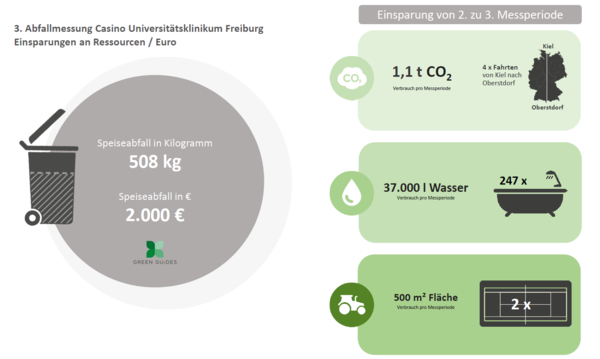Completely full and happy
Central kitchen and casino reduce food wasteOn the way to climate- and resource-friendly catering: In the central kitchen and staff canteen at Freiburg University Medical Center, food waste was measured precisely for several weeks between 2022 and 2024. How much waste is produced during food preparation? How many meals are prepared too much? And what ends up as leftovers on the plates? The teams in the central kitchen and staff canteen kept precise records of this. "It was a real challenge to keep precise records of leftovers during ongoing operations," reports Stephanie Müller, Sustainability Officer for the University Hospital's commercial operations.
Soup of the day only on request
The measurements made it clear to the project team where a particularly large amount of waste is produced and how this can be reduced. For example, the soup of the day is no longer automatically placed on the tray for the approximately 1,600 lunches served to patients every day, but must be actively ordered from the menu assistants. The amount of soup has been halved and with it the amount of dishes that need to be washed. Thanks to optimized portioning of butter, margarine and side dishes, for example, less food is returned and the recipes are also optimized to reduce waste. In the second measurement, 5 percent less waste was produced per meal.
Less leftovers on the plates
In the staff canteen in Killianstrasse, waste per meal was reduced by 29% in relation to the number of meals produced: from 121 grams to 86 grams. The plates are returned empty much more often - thanks to a new ladle plan that precisely defines the quantity served for each dish. The ratio also has to be right: "If the amount of sauce matches the side dish, neither dry rice nor spoonfuls of sauce are left on the plates," explains Jochen de Rossi, team leader in the central kitchen.
The results are impressive: Compared to the measurement period at the beginning of 2024, 500 kilograms less food waste was produced in the staff canteen during the 19 measurement days at the end of 2024. In addition, 37,000 liters less water were consumed and more than one tonne of CO² emissions were avoided. And the project is still ongoing: "There are still a few things we can tweak to further reduce waste," says Joachim Tschocke, Head of Business Operations. "We will definitely keep at it."
University Medical Center Freiburg
Office of Governance, Quality and Sustainability
Breisacher Straße 153
79110 Freiburg
Phone: 0761 270-21851
nachhaltigkeit@uniklinik-freiburg.de


